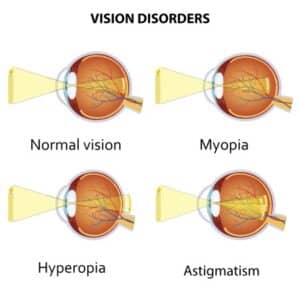How Long Does Lasik Last: Unveiling the Truth

Lasik typically lasts for a lifetime, providing long-lasting vision correction without the need for glasses or contact lenses. The procedure involves reshaping the cornea to correct refractive errors such as nearsightedness, farsightedness, and astigmatism.
By utilizing advanced laser technology, Lasik surgery can effectively improve vision and reduce the dependence on visual aids. With a success rate of over 95%, Lasik has become a popular choice for individuals seeking permanent vision improvement. The procedure itself is quick and virtually painless, with patients experiencing improved vision within a few days.
While age-related changes in vision may still occur, Lasik provides a lasting solution for most individuals.
Introduction To Lasik Eye Surgery
LASIK eye surgery offers long-term vision improvement, typically lasting for many years. The procedure reshapes the cornea, correcting vision problems and reducing or eliminating the need for glasses or contacts. Patients can expect lasting results and improved vision quality after LASIK surgery.
LASIK eye surgery is a popular corrective procedure that has revolutionized vision correction. If you’re tired of wearing glasses or contact lenses, LASIK may be the perfect solution for you. LASIK stands for Laser-Assisted In Situ Keratomileusis, a surgical procedure that reshapes the cornea to correct refractive errors such as nearsightedness, farsightedness, and astigmatism. In this article, we will discuss the rise of LASIK as a preferred corrective procedure and the basic principles behind LASIK.
The Rise Of Lasik As A Preferred Corrective Procedure
Over the past few decades, LASIK has become one of the most popular elective surgeries in the world. Millions of people have undergone the procedure to correct their vision, and the numbers continue to grow. The reasons for this are numerous, but the primary one is the effectiveness of LASIK. The procedure is quick, painless, and provides immediate results. Patients report improved vision almost immediately after the surgery, and many experience 20/20 vision or better.
Basic Principles Behind Lasik
LASIK eye surgery is a two-step procedure that involves the creation of a corneal flap and the reshaping of the cornea. During the first step, a femtosecond laser creates a thin flap in the cornea, which is then lifted to expose the underlying corneal tissue.
In the second step, an excimer laser is used to reshape the cornea, correcting any refractive errors. The corneal flap is then repositioned, and the eye is left to heal naturally. The success of LASIK depends on a variety of factors, including the patient’s age, overall health, and the severity of their refractive error. While LASIK is a safe and effective procedure, it is not without risks. Like any surgery, LASIK carries a small risk of complications such as infection, dry eyes, and glare or halos around lights at night.
However, these risks are relatively rare, and most patients experience significant improvements in their vision with minimal side effects. In conclusion, LASIK eye surgery is a popular and effective procedure for correcting refractive errors. With millions of successful procedures performed worldwide, LASIK has become the preferred choice for many people who want to improve their vision. If you’re considering LASIK, it’s important to research the procedure thoroughly and consult with an experienced eye surgeon to determine if it’s the right choice for you.
Expectations Vs. Reality
Considering Common misconceptions about LASIK longevity, it’s essential to address Realistic outcomes after surgery. Let’s delve into the Expectations vs. Reality of how long LASIK lasts.
Common Misconceptions About Lasik Longevity
- Belief: LASIK provides permanent perfect vision.
- Reality: Vision can change over time due to aging.
Realistic Outcomes After Surgery
- Expectation: LASIK guarantees lifelong vision improvement.
- Reality: Enhances vision, but changes can occur with age.
Factors Influencing Lasik Durability
When considering LASIK eye surgery, one of the most common questions is, “How long does LASIK last?” The durability of LASIK results can vary depending on several factors. Understanding these factors can help you make an informed decision about whether LASIK is the right choice for you. Here are two key factors that influence the longevity of LASIK results:
Age And Lasik Effectiveness
Your age can play a role in the effectiveness and longevity of LASIK. Generally, LASIK is most effective for individuals who are 18 years or older and have a stable vision prescription. This is because younger individuals tend to have more stable eye measurements, which can lead to more accurate surgical outcomes.
However, it’s important to note that LASIK can still be successful for older individuals. While the natural aging process can affect vision over time, LASIK can significantly improve vision and reduce the need for glasses or contact lenses. The effectiveness of LASIK may vary depending on individual circumstances, so it’s essential to consult with an experienced eye surgeon to determine if LASIK is suitable for you.
Impact Of Pre-existing Conditions
Pre-existing eye conditions can influence the durability of LASIK results. Certain conditions, such as dry eye syndrome or corneal abnormalities, may require additional treatment or make LASIK less suitable. It’s crucial to undergo a comprehensive eye examination before undergoing LASIK to identify any pre-existing conditions that may affect the outcome.
Additionally, other health conditions, such as diabetes or autoimmune disorders, can also impact the healing process and overall success of LASIK. Your eye surgeon will evaluate your medical history and discuss any potential risks or limitations associated with LASIK based on your specific circumstances.
| Factors Influencing LASIK Durability | |
|---|---|
| Age | Stability of vision prescription |
| Pre-existing eye conditions | Overall health conditions |
By understanding these factors, you can have realistic expectations regarding the durability of LASIK results. It’s essential to consult with a qualified eye surgeon who can assess your unique situation and provide personalized guidance.
The Role Of Technology In Lasik Outcomes
Technology plays a crucial role in LASIK outcomes, including the longevity of the procedure. The lasting effects of LASIK vary depending on individual factors such as age, eye health, and lifestyle, but advancements in technology have significantly improved the longevity of LASIK results.
With proper care and regular eye check-ups, LASIK can provide long-lasting vision correction for many years.
Advancements In Lasik Techniques
The world of LASIK has come a long way since its inception. With the advancements in technology, LASIK techniques have evolved to provide better outcomes and longer-lasting results. The traditional LASIK procedure involved using a microkeratome blade to create a corneal flap, which was then lifted to allow the laser to reshape the cornea. However, modern LASIK procedures use a femtosecond laser to create a more precise corneal flap, resulting in better outcomes and fewer complications.
How Technology Affects Longevity
The longevity of LASIK results is an important consideration for those considering the procedure. The good news is that with modern LASIK techniques and technology, the results of the procedure can last a lifetime. The use of femtosecond lasers to create a more precise corneal flap allows for a better fit and healing of the flap, leading to more stable outcomes.
Additionally, the use of wavefront technology allows for a more personalized treatment that can correct higher-order aberrations, resulting in better visual acuity and fewer complications. In conclusion, the role of technology in LASIK outcomes cannot be overstated. Advancements in LASIK techniques and technology have led to better outcomes, fewer complications, and longer-lasting results. If you are considering LASIK, it is important to choose a provider that uses the latest technology and techniques to ensure the best possible outcomes.
Maintenance After Lasik
After undergoing LASIK surgery, maintaining proper care of your eyes is essential to ensure the longevity of your improved vision. By following post-operative care essentials and adopting long-term eye health practices, you can prolong the benefits of LASIK and preserve your vision for years to come.
Post-operative Care Essentials
- Use prescribed eye drops as directed by your surgeon to promote healing and reduce the risk of infection.
- Avoid rubbing your eyes to prevent dislodging the corneal flap created during the procedure.
- Wear the protective eye shield while sleeping to shield your eyes from accidental rubbing or pressure.
- Avoid swimming and hot tubs for at least two weeks to minimize the risk of waterborne infections.
- Attend follow-up appointments with your surgeon to monitor the healing process and address any concerns.
Long-term Eye Health Practices
- Protect your eyes from UV exposure by wearing sunglasses with 100% UV protection when outdoors.
- Maintain a healthy lifestyle with a balanced diet and regular exercise to support overall eye health.
- Avoid smoking, as it can contribute to various eye conditions and hinder the long-term benefits of LASIK.
- Follow proper workplace ergonomics to reduce eye strain from prolonged screen time and reading.
- Schedule regular eye exams with an optometrist to monitor your vision and address any changes or concerns.

Credit: clevelandeyeclinic.com
When Touch-ups Are Needed
While LASIK is a highly effective vision correction procedure, it is important to understand that the results are not always permanent. In some cases, individuals may require touch-up procedures to maintain optimal vision. Identifying the signs that indicate the need for a LASIK enhancement is crucial in ensuring long-lasting results.
Identifying Signs For Lasik Enhancement
After undergoing LASIK, it is normal to experience some fluctuations in vision during the healing process. However, if you notice any of the following signs, it may indicate the need for a touch-up:
- Blurred or hazy vision
- Difficulty seeing objects in low light conditions
- Increased sensitivity to light
- Halos or glare around lights
- Eye strain or fatigue
If you experience any of these symptoms, it is important to schedule a follow-up appointment with your LASIK surgeon. They will perform a comprehensive evaluation of your eyes to determine if a touch-up procedure is necessary.
The Process Of Undergoing A Lasik Touch-up
If it is determined that a LASIK touch-up is required, the process is similar to the initial LASIK procedure. Here is an overview of what you can expect:
- Pre-operative evaluation: The surgeon will conduct a thorough examination of your eyes to assess their current condition and determine the best approach for the touch-up.
- Preparing for the procedure: Just like the initial LASIK surgery, you will be instructed to refrain from wearing contact lenses for a certain period of time prior to the touch-up.
- The touch-up procedure: The surgeon will use the same laser technology to make the necessary adjustments to your cornea. The procedure is typically quick and painless.
- Post-operative care: After the touch-up, you will be provided with detailed instructions on how to care for your eyes during the healing process. It is important to follow these instructions closely to ensure the best possible outcome.
Remember, the need for a touch-up procedure is relatively rare, and most individuals achieve long-lasting results with their initial LASIK surgery. However, if you do require a touch-up, rest assured that the process is safe and effective in maintaining your vision.
Lasik Longevity: Personal Testimonials
Discover LASIK longevity through personal testimonials. Learn how long LASIK lasts from real experiences, shedding light on the long-term benefits of this vision correction procedure. Hear from individuals who have enjoyed lasting results and improved vision after undergoing LASIK surgery.
Success Stories And The Test Of Time
Many patients share their positive experiences with LASIK, highlighting its long-lasting effects.
Improved vision endures for years, enhancing daily life and boosting confidence.
Common feedback includes quick recovery and minimal discomfort during the procedure.
When Results Didn’t Meet Expectations
Some individuals may have unmet expectations post-LASIK, requiring additional procedures.
Regular follow-up appointments are crucial to address any issues promptly.
Choosing an experienced surgeon can help minimize risks and ensure successful outcomes.

Credit: www.ccfs2020.com
Making The Decision For Lasik
LASIK is a popular refractive surgery that can correct vision problems such as nearsightedness, farsightedness, and astigmatism. The results of LASIK are usually long-lasting, with many patients experiencing improved vision for years after the procedure. However, the longevity of the results depends on various factors such as age, prescription, and lifestyle.
Consulting With Lasik Professionals
Seek advice from experienced LASIK professionals. Making the Decision for LASIK: Considering LASIK? Evaluate the risks and benefits. Consult with LASIK professionals for expert guidance.
Evaluating The Risks And Benefits
Understand the potential risks and benefits clearly. LASIK offers improved vision but carries some risks.
Conclusion: The Lifespan Of Lasik
The Lifespan of LASIK: Exploring the longevity of LASIK eye surgery, it’s crucial to understand how the procedure’s effectiveness evolves over time.
Summarizing Lasik’s Effectiveness Over Time
LASIK’s initial success rates are high, with vision improving significantly right after surgery.
Stability is typically achieved within the first few months post-operation, setting the foundation for long-term visual clarity.
Over the years, prescription changes may occur, but enhancements can address these issues, maintaining sharp eyesight.
Final Thoughts On The Permanence Of Lasik
- LASIK offers enduring vision correction for many individuals.
- Regular eye check-ups are advisable to monitor any changes.
- Enhancements can be performed if vision changes over time.
Frequently Asked Questions
How Long Does Lasik Last?
LASIK can last a lifetime for many people, as the reshaped cornea remains stable. However, factors such as age, eye health, and changes in vision can affect the long-term results. Regular eye check-ups are essential to monitor any changes and ensure lasting results.
Conclusion
Lasik eye surgery can provide long-lasting vision improvement for many individuals. The procedure offers a high success rate and can last for many years, reducing the need for glasses or contact lenses. However, it’s important to consult with an eye care professional to understand the individual factors that can influence the longevity of the results.
Regular eye check-ups are essential for maintaining optimal vision.





